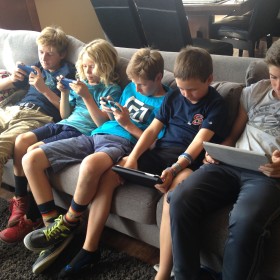 We have just returned from a family vacation in Whistler, Canada. Some days we took a gondola up the mountain and hiked trails to streams and waterfalls. Others we biked around the countryside to swim in local lakes. With five active grandsons ages 8-13 and their forty-something parents, we had plenty of exercise and physical challenge.
We have just returned from a family vacation in Whistler, Canada. Some days we took a gondola up the mountain and hiked trails to streams and waterfalls. Others we biked around the countryside to swim in local lakes. With five active grandsons ages 8-13 and their forty-something parents, we had plenty of exercise and physical challenge.
Yet whenever we returned from our adventures, the main pull for the boys was their electronic devices. And a typical parental request? Please turn that off and go outside or play a game. I often hear similar concerns from clients and friends. Which got me thinking: what are the benefits of digital tools and the web for kids?
When I did a little research and asked my grandsons about the positives, they had answers that fall into several categories:
Socialization-I text my friends, connect with new people on hobby sites, keep in touch with kids from camp or who have moved away
Education-I communicate with teachers, get help with homework, can learn about anything, share information, use my brain differently, am getting smarter
Creativity-I post videos, express myself, personalize cool apps, share pictures, find interesting resources, learn about different points of view
Entertainment-I play computer games, compete with myself, spend alone time, avoid boredom, improve coordination, keep busy, gain skills
Due to rapid hi-tech advances, it can be hard for the older generation to keep up. My grandsons are digital natives and the first ones I turn to when I need help with the computer. A survey by British communications watchdog Ofcom found that young children have a better understanding of modern technology than their parents. And teenagers born at the turn of the millennium have a higher DQ (digital quotient) because the Internet has always been a part of their lives. They’re confident and spend more time on their smartphones than any other cohort.
So there are powerful advantages to life online and a dark side as well. Distraction is a serious issue. When kids spend too much time flipping from texting to homework to music, they’re likely not doing any task well. And studies show that excessive social networking and game playing can affect schoolwork and sleep.
So what can you do? Help your kids keep a balanced relationship with technology through moderation. Restrict amount of time to prevent unhealthy dependency. Be aware of the pitfalls and set firm boundaries. Teach them how to use the Internet responsibly as they make informed decisions. And most importantly, limit your time online so they can learn from what you say and what you do.









